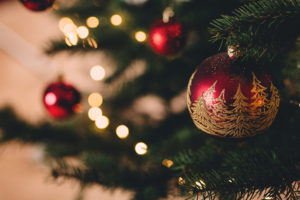What’s So Great about Christmas?

You’ll be doin’ all right, with your Christmas of white
But I’ll have a blue, blue blue blue Christmas
—“Blue Christmas” (written by Billy Hayes and Jay W Johnson)
While many of the popular songs tell us that late December is the season to be jolly, for many it can be the season to be decidedly less than, in part because we think everyone is having a holly, jolly time and we’re not. Feelings of isolation or reminders of strained family relationships also make the holidays hard, as can workloads that don’t let up or financial burdens that only increase with the pressure to buy stuff for loved ones.
So what’s so great about this time of year? Personally, I’m a sucker for outdoor lights and eggnog, and I imagine most of us can think of something we like about the end-of-year festivities.
One thing’s for sure, more Americans celebrate a secular and cultural Christmas these days than a religious one. Last year the Pew Research Center released data showing that most Americans see a decline in the religious aspects of Christmas and aren’t bothered by the shift. Most still celebrate—they decorate, bake, party and sing, put a tree in their house, give gifts, watch the Nutcracker—just not in a religious way. Driving around my own neighborhood I’ve noticed just one nativity scene and at least ten inflatable snowmen, a Snoopy in a Santa hat, and a reindeer riding a Harley. So for any non-Christians out there who’ve long felt sheepish about partaking in aspects of Christmas, it’s time to get over it.
I imagine there are still a fair number of nonreligious, rational folks who draw the line at perpetuating the Santa myth, but of course that’s a myth with a built-in expiration date, so far less damaging than many others.
A few weeks ago a substitute teacher in New Jersey made news when she told a class of first graders that Santa, the Easter Bunny, and the Tooth Fairy were all fake—that the kids’ parents were the ones surprising them with gifts, chocolate, and money. I remember when I realized there was no Santa—I was awake in bed on Christmas Eve and heard my parents whispering along with sounds of packages being moved. What I remember is a feeling of total gratitude that they were going to the trouble to make the “magic” seem real.
But in New Jersey kids were crying and people were calling for the substitute’s head, claiming kids had been emotionally scarred by her truth-telling session. One mother who posted about the incident on Facebook acknowledged it was a tough thing to respond to but concluded with,
Please no negative comments about the substitute. We don’t know her situation and perspective, and no matter how unfortunate a situation, we must all learn from this that Christmas magic is real and shown through acts of kindness, love, positivity and grace for/from loved ones as well as strangers. Moral of the story: Just be kind. When in doubt, Always choose being kind, and you will always be in the right.
Kindness can certainly increase kinship, and being with others is a good antidote to the holiday blues. “For the great majority of the population, what’s almost synonymous with the festivity of the holidays is the coming together and reestablishing/reaffirming close ties with those who are your kin, or at least those you feel a spiritual kinship to,” says Lee Seltzer, a humanist psychologist and blogger at Psychology Today. “If you’ve just moved to a new state because you got transferred or had to leave because you couldn’t find a job in your area, and presently are without a ‘replacement’ support system, you can feel acutely lonely during the holidays. And I’ve always thought that loneliness was actually a ‘first cousin’ of depression.” Seltzer also notes that seasonal sadness can be related to a more clinical form of depression known as Seasonal Affective Disorder and points to some tips for addressing that.
I asked Seltzer if nonreligious individuals were more susceptible to seasonal sadness. Being a member of a church or congregation can certainly provide a sense of belonging and support and thereby minimize depression, he says, but “there’s nothing about organized religion itself that keeps you from feeling sad during the holidays. It’s all a matter of having some meaningful affiliation with like-minded others that can make you feel, um, ‘merry.’” Fellow humanists, he notes, “can do the job nicely.”
And if a solid in-group is still elusive for some, seeking out and fostering smaller interactions can help combat feelings of loneliness too. I was at the post office the other day and the woman behind the counter was incredibly cheerful. A man dropped off his prepaid boxes, thanked her, and asked her name. “Henrietta,” she smiled. An older gentleman, he beamed back at her and repeated the name a few times. “Yes, Henrietta! Thank you, thank you!” I told her she had a real fan and she laughed. “He comes in here a lot. Always asks my name, tells me it’s French, and always says he’ll remember it next time. Then the next time he asks again! All I know is my grandmother raised me and she named me after her father Henry.” The fond way she spoke about her regular customer told me they were friends of a sort. Even if minor, a collection of these kinds of relationships can certainly help combat loneliness.
So yes, the holidays can be many things, and not all of them great (Rudolph on a motorcyle comes to mind). But embracing the season as a time to connect is the best way to avoid a blue, blue, blue Christmas.
